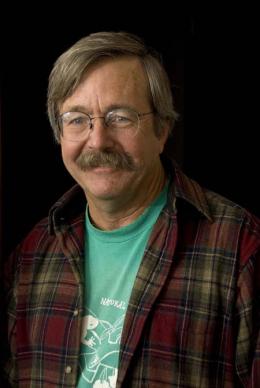Read the full text transcript (PDF) and listen to the audio of the oral history with Steve Gliessman.
 Stephen R. Gliessman. Photo by Jennifer McNulty.
Stephen R. Gliessman. Photo by Jennifer McNulty.An internationally recognized leader in the field of agroecology, Stephen (Steve) Gliessman is the Alfred E. Heller Professor of Agroecology in UC Santa Cruz’s Environmental Studies Department, where he has taught since 1981. He earned his doctorate in plant ecology at UC Santa Barbara, and was the founding director of the UCSC Agroecology Program (now the Center for Agroecology and Sustainable Food Systems). His teaching focuses on agroecology, sustainable agriculture, organic gardening, ethnobotany, California natural history, botany and ecology. He is the author of the groundbreaking textbook Agroecology: The Ecology of Sustainable Food Systems (Second Edition, CRC 2006), and numerous other books and articles. In 2008, Gliessman became the chief editor of the internationally known Journal of Sustainable Agriculture.
Gliessman’s activities in the field of sustainable agriculture are extensive. He founded and directs the Program in Community and Agroecology (PICA), an experiential living/learning program at UCSC. He heads UCSC’s Agroecology Research Group, an interdisciplinary body of faculty, graduate, and undergraduate students, research associates, postdoctoral researchers, and international visitors from the agroecological community. In 2001, Steve and his wife Robbie Jaffe (also interviewed in this series) started the Community Agroecology Network (CAN). CAN’s goal is to help a network of rural, primarily coffee-growing communities in Mexico and Central America develop self-sufficiency and sustainable growing practices. CAN markets coffee directly to individuals, institutions, and markets in the United States. Those who wander through the Downtown Santa Cruz Farmers’ Market can sample and purchase CAN coffee at the market, UCSC students can drink it in campus dining halls and cafes, and everyone else can order the coffee and have it shipped to their home. CAN and PICA also co-sponsor the International Agroecology Short Course, which Gliessman has taught since 1999 in venues as diverse as Costa Rica, Mexico, and Vermont.
A consummate storyteller, Gliessman reflected on the diverse aspects of his life in agroecology in this comprehensive interview conducted by Irene Reti on three different occasions: April 16, May 25, and June 12, 2007, in his offices on the UCSC campus. Gliessman’s office shelves are packed with books and journals, conference programs, buttons, posters, and other archival material representing forty years of reading and publishing in his field. He assured Reti that he “never throws anything away.” He sometimes referred to these books during the interview; at one point he held up a packet of heirloom seeds from Brazil, at another a bottle of olive oil from his own organic orchard and vineyard, Condor’s Hope Ranch in Santa Barbara County, California—a place close to his heart.
Links:
- Selected List of Gliessman’s Publications: http://www.agroecology.org/Steve_Pubs.html
- The UCSC Agroecology Research Group’s excellent website on agroecology: http://www.agroecology.org/
- UC Santa Cruz’s Program in Community and Agroecology (PICA): http://ucscpica.org/
- Community Agroecology Network (CAN): http://www.canunite.org/
- The Vivid Picture Project: http://www.vividpicture.net/
- Condor’s Hope Winery: http://www.condorshope.com/

 Santa Cruz, CA
Santa Cruz, CA



